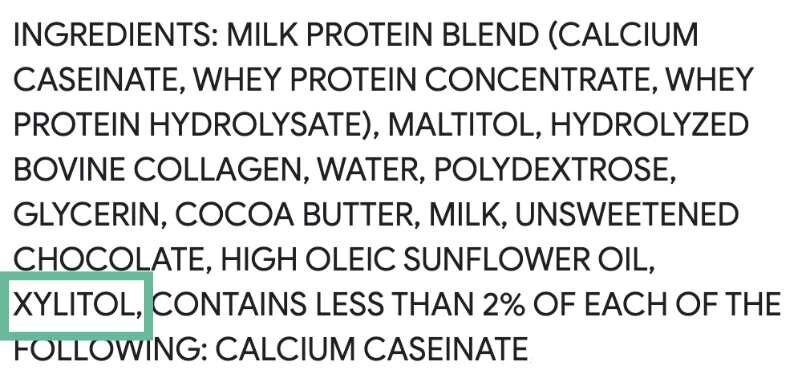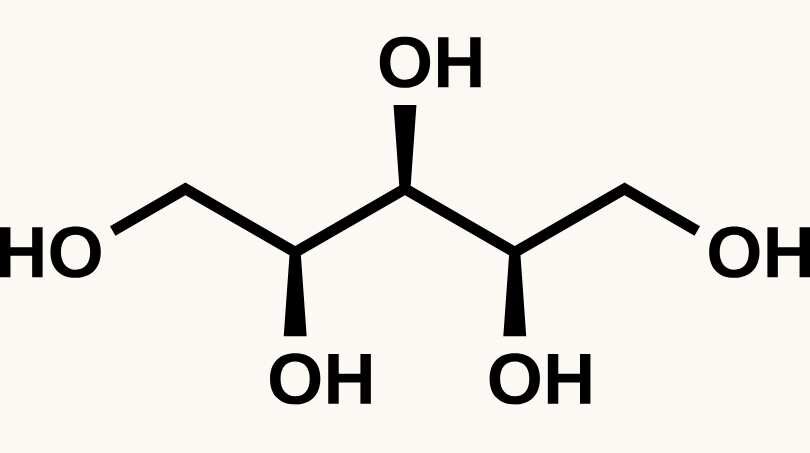It sure sounds scary, but is the sugar alcohol Xylitol harmful? You may have noticed the ingredient Xylitol in your favourite protein bar and wondered what it was and how it can affect your health. In this xylitol ingredient review, our expert dietitian breaks down everything you need to know about this popular sugar replacement to help you make an informed choice at the grocery store.
What is Xylitol?
Xylitol is a type of sugar alcohol. Sugar alcohols are non-sugar sweeteners commonly added to low-calorie or sugar-free foods such as protein bars, candy, and sweets. Xylitol is naturally present in small amounts in carbohydrates such as oats, berries, and mushrooms. It is also produced in the body as a by-product of carbohydrate metabolism.
Xylitol Manufacturing
Though sugar alcohols are naturally present in some fruits such as berries, plums, and apples, most sugar alcohols added to packaged foods are manufactured for large-scale use in the food industry. In this case, Xylitol can be manufactured by hydrogenation or fermentation of the sugar xylose which converts the sugars into alcohol.

Xylitol Metabolism
After consuming, xylitol is fully metabolized within 4-6 hours. Almost 25% of xylitol consumed is absorbed in the digestive tract and metabolized similarly to glucose. This portion of xylitol provides 2.5 calories per gram, nearly half the calories found per gram in sugar. The remaining 75% of ingested xylitol is metabolized by gut bacteria in the large intestine and excreted via feces.
Xylitol Uses
Xylitol was discovered in 1891 and was first used in foods after the Second World War in response to sugar shortages. It is as sweet as sugar but with only half the calories per gram and a lower glycemic index. For this reason, Xylitol is commonly found today as a sugar replacement in low-sugar foods such as protein bars, sugar-free candies and gum.
Xylitol and Health
Does Xylitol Increase Your Risk of Heart Attack?
A recent study investigated xylitol’s effects on blood clotting. Researchers measured xylitol levels in humans after an overnight fast and found those with higher xylitol serum levels had a significantly higher 3-year risk of MACE (Major Adverse Cardiovascular Event) compared to control. It’s important to note that since researchers measured levels after a fast, the xylitol levels are not reflective of food intake, but rather xylitol naturally produced in the body.
However, the researchers also measured blood platelet response to xylitol levels after consuming a xylitol-sweetened drink. Here, they found that higher xylitol levels in the blood lead to a short-term 1000x increase in platelets (blood clotting factor), which we know is a risk factor for heart attack.
Xylitol and Digestion
Most people can digest and tolerate moderate amounts of sugar alcohol. One exception to this is in individuals with Irritable Bowel Syndrome (IBS). Xylitol is a type of Polyol, also known as a FODMAP. FODMAPs are types of carbohydrates in the diet that are fermented in the large intestine and can trigger digestive symptoms in people with IBS. For this reason, some people with IBS may need to avoid intake of sugar alcohols altogether, as they can cause gas, bloating, pain, and diarrhea, even in small amounts.
Xylitol and Gut Microbiome
Some early research has indicated that non-sugar sweetener intake can cause negative changes in the gut microbiome. However, not all non-sugar sweeteners seem to have the same effect. Some studies using mice have noted changes in microbiota after consuming xylitol, likely because xylitol inhibits the growth of glucose-fermenting bacteria. We know that diet changes alter the gut microbiome, but more research is needed to determine the effects of consuming xylitol specifically on the gut microbiome of humans.

Xylitol and Dental Carries
Sugar alcohols are resistant to the bacteria in the mouth responsible for breaking down sugars and increasing the risk of cavities. Xylitol, in particular, may help to prevent tooth decay.
Xylitol and Blood Sugars
Sugar alcohols are only partially digested and absorbed, so they do not impact blood sugars to the extent of sugar. In addition, Xylitol has a low glycemic index. This means that xylitol converts to sugar and is released into the bloodstream slower than actual sugar.
Bottomline: Is Xylitol Harmful?
Pros: compared to sugar, xylitol has a reduced impact on blood sugars and reduces the risk of dental caries.
Cons: as with all sugar alcohols, xylitol can cause digestive side effects such as gas, cramping, and diarrhea, especially when consumed in larger doses. Consuming xylitol-sweetened foods may temporarily promote blood clotting in the 4-6 hours post-consumption, which is a risk factor for heart attack.
Bottomline: More research is needed to understand the cardiovascular risk associated with xylitol fully. Overall, limit your intake of all non-sugar sweeteners, including xylitol. When choosing non-sugar sweetened items, opt for a product with an alternate sweetener than xylitol, such as Stevia or Monk Fruit, where able.
Other Posts Worth Checking Out:
- Is Maltitol Bad for You? Dietitian Review
- What Are Tocopherols? Ingredient 101
- Is Xanthan Gum Safe? Ingredient 101
References:
- Mérillon, J.-Michel., & Ramawat, K. Gopal. (Eds.). (2018). Sweeteners Pharmacology, Biotechnology, and Applications (1st ed. 2018.). Springer International Publishing. https://doi.org/10.1007/978-3-319-27027-2
- Marco Witkowski, Ina Nemet, Xinmin S Li, Jennifer Wilcox, Marc Ferrell, Hassan Alamri, Nilaksh Gupta, Zeneng Wang, Wai Hong Wilson Tang, Stanley L Hazen, Xylitol is prothrombotic and associated with cardiovascular risk, European Heart Journal, 2024;, ehae244, https://doi.org/10.1093/eurheartj/ehae244
- Sugar Alcohols (Polyols) and Polydextrose Used as Sweeteners in Foods – Food Safety – Health Canada, 2005.
- Mansueto P, Seidita A, D’Alcamo A, Carroccio A. Role of FODMAPs in Patients With Irritable Bowel Syndrome. Nutr Clin Pract. 2015 Oct;30(5):665-82. doi: 10.1177/0884533615569886. Epub 2015 Feb 18. PMID: 25694210.
- Janket SJ, Benwait J, Isaac P, Ackerson LK, Meurman JH. Oral and Systemic Effects of Xylitol Consumption. Caries Res. 2019;53(5):491-501. doi: 10.1159/000499194.
- Xylitol, Glycemic Index Search, The University of Sydney. Accessed July 30 2024.


